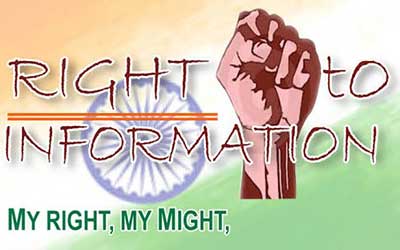Date: 14/10/2022
Relevance: GS-2: Important aspects of governance, transparency and accountability, e-governance applications, models, successes, limitations, and potential; citizens charters, transparency & accountability and institutional and other measures.
Key Phrases: Right to Information Act, Public Information Officers, Freedom of Speech, Informed Citizenry, Increasing backlogs, Defunct Commissions
Why in News?
- Even after 17 years of the passing of the Right to Information (RTI) Act, the transparency regime in the country remains merely a dream with nearly 3.15 lakh complaints or appeals pending with 26 information commissions across India.
- Till now, more than 4.2 crore RTIs have been filed and 26 lakh second appeals are there before the commissions.
Key highlights of the report by the Satark Nagrik Sangathan:
- Increasing backlogs: The backlog of appeals or complaints is steadily increasing in commissions every year. The highest number of pending cases was in Maharashtra at 99,722 followed by Uttar Pradesh at 44,482, Karnataka at 30,358, the Central Information Commission at 26,724 and Bihar at 21,346.
- Defunct Commissions: Jharkhand and Tripura have been completely defunct for 29 months and 15 months respectively; Manipur, Telangana, West Bengal and Andhra Pradesh are without chiefs.
- Pending vacancies: Several information commissions, including the Central Information Commission, are working at reduced capacity with less than the stipulated number of members being in office. Currently, 41 out of 165 posts of Chief Information Commissioner and information commissioners are vacant as compared to 36 last year in 2021.
- Reluctance to impose penalties: The commissions did not impose penalties in 95% of the cases where penalties were potentially imposable.
- Long waiting time for case disposal: In several commissions, there is a long waiting time for disposal of cases on account of a large backlog of cases as governments have failed to make appointments of information commissioners in a timely manner.
- Lack of transparency: There is an urgent need for the transparency watchdogs to function in a more effective and transparent manner.
- Lack of e-filing facility: Only 11 information commissions out of 29 provide e-filing facilities for RTI applications or appeals, but only five are functional.
The Right To Information (RTI) Act 2005:
- The RTI Act 2005 sets out the rules and procedures regarding citizens’ right to information.
- It was enacted in order to consolidate the fundamental right in the Indian constitution freedom of speech.
- The issues such as corruption and scandals, international pressure and activism, modernization and the information society, etc. caused its enactment in 2005.
Key provisions of the Act:
- The Act provides a definition of Information and what constitutes Public Officials for the purpose of the Act.
- Section 4 requires suo moto disclosure of information by each public authority. This provision is to empower citizens to make informed decisions.
- Section 8 (1) mentions exemptions against furnishing information under RTI Act. This is to save critical and strategic information from going out of context.
- Section 8 (2) provides for disclosure of information exempted under the Official Secrets Act, 1923 if a larger public interest is served.
- The Act provides for the appointment of Information Commissioners at the Central and State levels and a designated Public Information Officer responsible to give information to a person who seeks information under the RTI Act.
Do you know?
Who is a Public Authority under the act?
- Public Authority means any authority or body or institution of
self-government established or constituted-
- by or under the Constitution;
- by any other law made by Parliament;
- by any other law made by the State Legislature;
- by notification issued or order made by the appropriate
Government, and includes any-
- body owned, controlled or substantially financed;
- non-Government organization substantially financed, direct or indirectly by funds provided by the appropriate Government;
RTI Amendment Act 2019:
- As per the amendment act, the central government will notify the term of office for the CIC and the ICs.
- The salaries, allowances, and other terms and conditions of service of the central and state CIC and ICs will also be determined by the central government.
Way forward:
- A code of conduct must be evolved for the central and state information commissioners.
- It is imperative for the commissioners to keep a strict distance from government heads and officialdom.
- Key stakeholders seem to be losing their enthusiasm and it is now up to the public, civil society, media, courts and finally the commissioners themselves to shore up the sagging morale of the RTI set-up.
- The Act clearly states that the final appeal lies with the information commissions, so the appeals in High Courts which are masked as writs to obtain relief from high courts, must be dealt with by ICs only.
Conclusion:
- Under the RTI law, information commissions are the final appellate authority and are mandated to safeguard and facilitate people’s fundamental right to information.
- An analysis of penalties imposed shows that proper functioning of information commissions is crucial for people to realise their right to information.
- The digital RTI portal (website or mobile app) can deliver more efficient and citizen-friendly services, not possible through conventional mode.
- This will be beneficial for both transparency seekers and the government.
Source: The Hindu
Mains Question:
Q. The RTI Act is a sunshine legislation aimed at eradicating corruption and promoting transparency. However, the act has not attained its objectives on account of various systemic challenges impeding its success. Examine. (250 words).






















